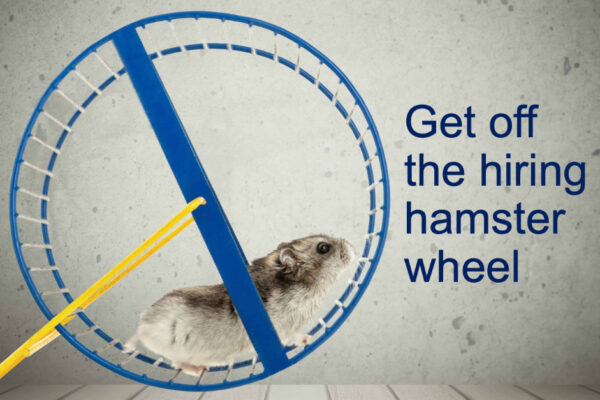Back in pre-war (!) days earlier this year, I recommended leaders take action to help themselves and their people deal with fear … might be a good thing to review the LinkedIn article, given the past few weeks:
Why your “transformation” or “agile” (or whatever) change may be failing …
We got another call from a company wanting “agile transformation” …
The problem? They are focused on “agile” as techniques that promise to produce big results. They haven’t considered the radical implications of the underlying principles … a cause of many transformation and “agile” failures.
Here is a great observation from Perry Marshall:
“Businesses are failing today because they are ignoring principles and trying to replace them with techniques.
… It’s very important to recognize the difference between a principle and a technique. A technique is a “trick” that you use to get something done, something that works in a very specific situation. A principle, however, is something that’s universally true, something that transcends any particular company or circumstance.
… There have never been more people skimming the surface of life and living on [techniques] “crack cocaine” than there are right now.”
Perry is referring to the ongoing massive changes in marketing and advertising … for example, what techniques worked on Google yesterday have changed today. Keeping up with the changes is important, but it is more important to know the underlying principles of marketing and advertising to win long-term.
The principle about techniques vs. principles, though, applies to every business.
New techniques feel great momentarily because of the illusion of real change … “we’re doing something different!” … and the momentary success. Things fall apart when a different situation is encountered, and the techniques don’t work quite like they did before … if at all. It takes knowledge of the underlying principles to adapt techniques for a new environment or pick more suitable techniques.
Things also fall apart if work techniques change but the underlying principles behind policies, procedures, etc. do not … the principles will win out in the end. And the “change” will fail because the foundation did not change.
Real change … sustainable change … only occurs when there is change in the techniques AND the underlying principles, and the techniques and principles align.
What have you been focusing on lately?
A great learning tool for anyone wanting to become a leader or to improve their leadership
–> Watch leaders during crises.
What they say, how they behave. The effects on their teams, organizations, stakeholders, constituencies.
Government leaders, business leaders … any kind of leader and at all levels are candidates.
The pandemic, Russian invasion, and other recent crises have provided incredible opportunities to learn by watching.
Anytime you see, read, or hear something that strikes you as either good or bad leadership, make a quick note. If on a computer or device, save the item and annotate it as needed.
Periodically review your notes and pick one (or a very few) top things to work on. Observe how you do and adjust as needed.
Your observations will also help you identify your perspectives on leadership. In time, the accumulated notes and annotations will build your own leadership “book” of how you think leadership should work (and not work!).
The act of formalizing observations by making notes will also make you a better observer, which in turn is an important aspect of leadership as well.
Not convinced? Even children have used a process like this 🙂
The “Blue’s Clues” children’s TV show had a recurring theme, at least in early episodes, of Notice-Note-Noodle … children were encouraged to follow the host along in noticing clues, making notes about them, and then thinking (there was even a “thinking chair” in the show) to figure out the clues.
What are a leader’s early warning signs of work going astray?
The first one is that you have no warning signs built in.
Most leaders have learned how to set goals and communicate those. Some have learned how to define, distill, and disseminate an inspiring vision. And some have learned how to collaborate in goal and expectation setting.
What’s frequently missing is pre-scheduled 2-way feedback.
People can go astray like projects … feedback is fundamental to any leadership activity where there is any uncertainty.
(see the previous post about project feedback)
For short tasks with little uncertainty, completion – the accountability of checking “done” – can be sufficient feedback.
For anything other than a short task, build in scheduled feedback cycles at the time of agreement. The frequency and type of feedback cycles should be based on the level of uncertainty about things like:
- The end result’s contribution to achieving goals,
- The path forward,
- Ability to perform (e.g., motivation, how much guidance/development the person needs),
- Any other significant risks.
You can also think of this as a form of risk management. And also people development by increasing the ability for bit-by-bit feedback for improvement.
Have you built regular feedback cycles into how you lead?
It’s a key part of the basic leadership mechanism we call “4-part Harmony” …
Depending on uncertain plans?
This question trips up lots of folks, at all levels …
“How are your retrospectives going?”
You can insert “learning review sessions” or something else similar in the same spot as “retrospectives” … the answer is usually the same: there is no real answer. Just a lot of “uh” and other stalling sounds, sometimes along with some form of mumbling.
In those cases, it’s almost guaranteed that the reason their ______ isn’t working as expected. (Fill in the blank with any important effort like a critical strategic plan initiative, transformation, agile implementation, etc.)
Doing something new implies there is some level of uncertainty. A fundamental principle is that you can’t construct perfect plans amid uncertainty.
Jim Highsmith said it well: “Many traditional planners don’t understand a key concept – you can’t ‘plan’ away uncertainty. Uncertainty is another way of expressing what we don’t know – about the ends or the means. For most uncertainties (lack of knowledge) the only way to reduce the uncertainty and gain knowledge is to execute – to do something, to build something, to simulate something – and then get feedback.”
The point of feedback – as Jim cited above – is to check and adjust the initial plan and progress (or lack thereof).
Post-mortems, lessons learned sessions, and the like are great … but at the end of the effort there is nothing that can be done to improve results of that effort. Only improve future efforts. That’s good, but why not also improve current efforts?
It’s far better to be checking and adjusting along the way, rather than waiting until the end. If there is no checking and adjusting (e.g., retrospectives) along the way, then you are depending on an initial plan based on uncertainty – an uncertain plan.
Do you depend on uncertain plans?
Fundamental error. And one that can be hazardous to both your company and your career health.
How to win the talent war and your market
Facing a hiring crisis? Can’t get enough people? People leaving in the “great resignation”?
Those are symptoms of the common, real problem: your managers.
Gallup engagement surveys over the years point to managers as the biggest factor in hiring and retention success or failure. Other research shows half of managers don’t even want to manage people!
Business consultant Robert Michon says it well:
“I could walk into ANY market right now, do NOTHING to change your marketing, and quickly dominate solely by making a single move: DRAMATICALLY improve the people management area of your business.”
Businesses that pay attention to people management will succeed while others lose. Yet most businesses obsess over everything else but dramatically improving people management.
Why?
- It’s not an overnight fix.
- It may be not easily definable in real-time “metrics” that show I’m doing good work.
- It’s not fixable by a “silver bullet,” and least of all by traditional “training.”
- It often involves people systems like performance management and compensation as well.
And it takes answering the key question: “what do we believe about people?”
Ready to answer that question and get off the hiring hamster wheel? To dominate your market?
Don’t wait until it’s too late and let someone else figure this out while the domination door is open. Contact Mike Russell to explore proven methods to supercharge your people management.





